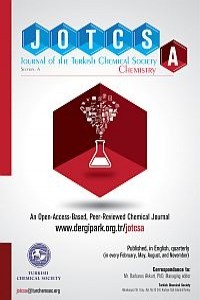Quantitative Structure Activity Relationship (QSAR) and Molecular Docking Study of Some Pyrrolones Antimalarial Agents against Plasmodium Falciparum
Quantitative Structure Activity Relationship (QSAR) and Molecular Docking Study of Some Pyrrolones Antimalarial Agents against Plasmodium Falciparum
The increase in multidrug resistance malaria cases necessitates the need to search for new cost effective drugs. QSAR and molecular docking studies were performed on a data set of forty nine Pyrrolones antimalarial agents against Plasmodium falciparum. Forty two molecules were used as training set and seven as test set. The molecular descriptors were obtained by Density Functional Theory (DFT) (B3LYP/6-31G**) level of calculation. The QSAR model was built using Genetic Function Algorithm (GFA) method. The model with the best statistical significance (N = 42, R2ext = 0.700, R2 = 0.933, R2a = 0.916, Q2cv = 0.894, LOF = 0.417, Min expt. error for non-significant LOF (95%) = 0.250 was selected. The docking experiment was carried out using AutoDock Vina of PyRx and Discovery Studio Visualizer. Docking analysis revealed that three of the studied compounds with binding affinity values of -10.7 kcal/mol, -10.9 kcal/mol and -11.1 kcal/mol possess higher potency than standard antimalarial drugs with binding affinity of values of -8.8 kcal/mol, -9.5 kcal/mol and -9.0 kcal/mol. It is envisioned that the wealth of information provided by the QSAR and molecular docking results in this study will offer important structural insights for further laboratory experiments in the future design of novel and highly potent antimalarial from Pyrrolones.
Keywords:
: Antimalarial agents Density Functional Theory, Genetic Function Algorithm, Discovery Studio Visualizer,
___
- 1. J S, P M. The Economic and Social Burden of Malaria. NCBI. 2002 February 7; 415(6872).
- 2. R NC, S K. Severe Falciparum Malaria in Children Current Understanding of Phatophysiology and Supportive Treatment. NCBI. 1998 April 04; 78(1).
- 3. K BL, J LB. In Vitro Activity of Artemisinin Derivatives against African Isolates and Clones of Plasmodium Falciparum. Am J Trop Med Hyg. 1993 March 01; 49(3).
- 4. C K, Pandy RD. Structure Function of Falcipains: Malarial Cystein Proteases. Journal of Tropical Medicine. 2012 January 09; 10(1).
- 5. H BW, V CA, N BS, B L, J C, Goldberger N ea. Discovery of Antiandrogen Activity of Nonstroidal Scafford of Marketed Drugs. Proc Natl Acad Sci U S A. 2007 May 14; 104(29).
- 6. Y MM, A I. Efficient Method for High-Throghouput Vitual Screening Based on Flexible Docking: Discovery of Novel Actylcholinesterase Inhibitors. J Med Chem. 2004 August 10; 47(20).
- 7. I N, I R, N S, S G. Vitual Screening Identification and Invitro Testing of Novel Inhibitors of O-Actyl-L-Serine Sulfhydrolyse of Emtamoeba Histolytica. PLoS One. 2012 September 21; 7(2).
- 8. X EE, J HA, D MJ. Methods for Applying the Quantitative Structure Activity Relationship Paradign. Methods Mol Biol. 2004 December 01; 27(1).
- 9. L X, J B. Melocular Descriptors in Chemoinformatics; Computaional Combinatorial Chemistry and Virtual Screening. Comb Chem High Throughput Screening. 2000 June 29; 3(5).
- 10. X B, D MS. Unveiling the Full Potential of Flexible Receptor Docking Using Multiple Crystallographic Structures. J Med Chem. 2005 March 03; 43(48).
- 11. V RR, S JH, S VA, P KAC. Drug Design and Discovery. Intl J Drug Desgn and Descov. 2011 May 08; 9(2).
- 12. A P. DTC Euclidean Programme; Drug Theories and Chemoinformatics [DTC Euclidean Programme; Drug Theoretics and Chemoinformatics DTC Laboratory Jadapur University].; 2013 [cited 2016 Febuary 02. Available from: http://dtclab.webs.com/DTC Euclidean Documentation.pdf.
- 13. L E, J J, P WA, T CM, M MR, P G. Methods for Reliability and Uncertainity Assessment for Applicability Evaluations and Regretion Based QSARs. Environmental Health Perspective. 2003 June 17; 111(10).
- 14. P G. Principle of QSAR Model Validation: Internal and External. Qsar and Combinatorial Science. 2007 July 10; 26(5).
- 15. M A, U M, A K, S T, S V, Puliyath. Computational Drug Discovery of Potential Phosphodiesterase Inhibitors using Insilico Studies. Pac J Trop Discov. 2012 June 02; 10(7).
- 16. P D, P NR, H BR. Insilico Drug Designing Approach for Biotin Protein Ligase of Mycobacterium Tuberclosis. Asian J Pharm Clin Res. 2013 September 10; 6(1).
- 17. Monika JK, Singh K. Vitual Screening using the Ligand ZINC Data Base for Novel Lipoxgenase-3 Inhibitors. Journal of Bioinformatics. 2013 June 29; 9(11).
- 18. A AI, O WS, O AO. Molecular Docking Studies of Lonchocarpus Cynescens Triterpenoids as Inhibitors for Malaria. Journal of Physical Chemistry and Biophysics. 2016 April 04; 6(213).
- 19. Sachs JMP. The economic and social burden of malaria. 2002; 415.
- Başlangıç: 2014
- Yayıncı: Türkiye Kimya Derneği
Sayıdaki Diğer Makaleler
Enzyme Catalyzed Trans-Benzoin Condensation
Gökçil BİLİR, Ayhan Sıtkı DEMİR, Salih ÖZÇUBUKÇU
Şule DİNÇ ZOR, Özlem AKSU DÖNMEZ
Cüneyt H. Ünlü, Sevim İşçi Turutoğlu, Oya Galioğlu Atıcı, Ömer Işık Ece, Nurfer Güngör
Photophysics, pH Sensing and Hydrolysis Study of a Novel 1,8-Naphthalimide Derivative
